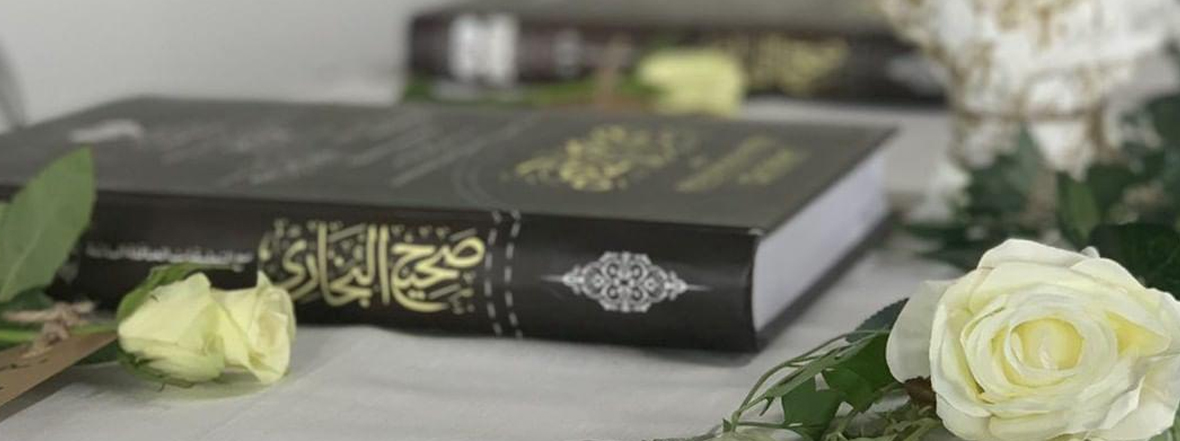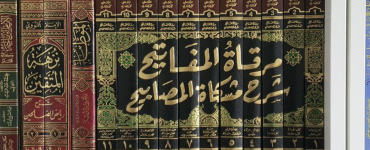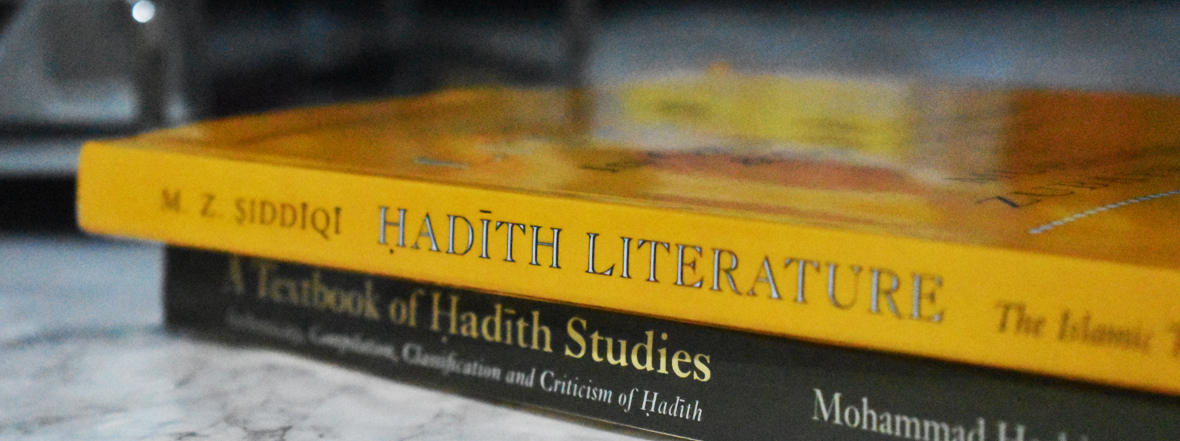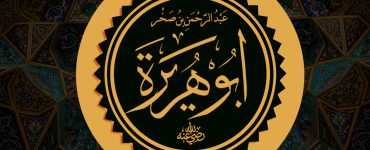بسم الله الرحمٰن الرحيم
The incidents below, which demonstrate the passion of the scholars of yesterday and the personal sacrifice they made in their pursuit of ḥadith, have been extracted from Al-Riḥlah fī Ṭalab al-Ḥadīth by Khaṭīb Baghdādī (may Allāh have mercy on him). It is hoped that by reading such incidents, our love for and appreciation of the galaxy of scholars who preceded us will increase.
In Pursuit of Just One Ḥadīth: Shuʿbah bin Ḥajjāj
Naṣr bin Ḥammād al Warrāq mentions that he was once revising with a group of other students whilst seated at the door of the master of ḥadīth, Shuʿbah bin Ḥajjāj (may Allāh have mercy on him), when he recited:
Isrāʾīl narrated to us, from Abū Isḥāq, from ʿAbdullāh bin ʿAṭāʾ, from ʿUqbah bin ʿĀmir (may Allāh be pleased with him), who said:
During the era of Rasūlullāh ﷺ, we used to take turns going out to graze the camels. One day I came back (from grazing the camels) and found Rasūlullāh ﷺ seated with his Companions around him. (Upon joining the gathering), I heard him ﷺ saying, “There is no one who performs ablution, doing so in an excellent manner, after which he performs two units of prayer, and then seeks forgiveness from Allāh, except that Allāh forgives him.”
I exclaimed out of amazement, upon which someone seated behind me grabbed hold of me and pulled me towards him. Turning around, I found that it was ʿUmar bin Khaṭṭāb (may Allāh be pleased with him), who told me, “The part before this was even better!”
“And what did he ﷺ say before this?” I enquired.
He replied that Rasūlullāh ﷺ had said, “Every person who testifies that there is no god but Allāh, and that Muḥammed is the Messenger of Allāh, will be told: Enter from whichever of the doors of Paradise you wish to enter.”
Upon hearing this narration, Shuʿbah (may Allāh have mercy on him) suddenly emerged from the house, slapped Naṣr bin Ḥammād across the face, and then promptly turned around and went back indoors. Naṣr, pained and embarrassed, retreated to a corner to be by himself.
Not long thereafter, Shuʿbah (may Allāh have mercy on him) emerged again and, catching sight of Naṣr, asked, “What’s he still crying for?”
One of those present, ʿAbdullāh bin Idrīs, remarked, “You ill-treated him!”
Shuʿbah (may Allāh have mercy on him) thus began explaining himself, saying:
“Be careful about what you narrate: Abū Isḥāq narrated this incident to us from ʿAbdullāh bin ʿAṭāʾ, from ‘Uqbah bin ‘Āmir (may Allāh be pleased with him). I thus asked Abū Isḥāq, ‘Who is ʿAbdullāh bin ʿAṭāʾ?’
However, instead of giving me an answer, he became angry at my question, and so I demanded of him, ‘You’d better help me authenticate this or else I’ll be sure to tear up everything that I’ve written from you!’
One of those present, Misʿar bin Kidām, thus told me that I would be able to find ʿAbdullāh bin ʿAṭāʾ in Makkah.
I therefore travelled all the way to Makkah, having had no intention for ḥajj or for anything but this one narration. In any case, I met ʿAbdullāh bin ʿAṭāʾ, but upon enquiring from him about the narration, he informed me that it was actually Saʿd bin Ibrāhīm who had narrated it to him!
Imam Mālik bin Anas (may Allāh have mercy on him), who was also present at the time, informed me that I would be able to find Saʿd bin Ibrāhīm in Madīnah, in which direction I thus set out. However, upon meeting Saʿd and enquiring from him about the narration in question, he informed me, ‘This ḥadīth is from your people! Ziyād bin Mikhrāq narrated it to me!’
When he mentioned Ziyād’s name, I exclaimed, ‘What kind of a narration is this? First it was from the people of Kūfah, then it was from the people of Madīnah, and now it’s suddenly from the people of Baṣrah!’
In any case, I then travelled all the way to Baṣrah, where I then met Ziyād bin Mikhrāq and enquired from him about this narration. However, his initial response to me was simply, ‘Don’t worry about this narration; it’s not your business.’
I repeated my question, saying, ‘Narrate it to me!’
‘Don’t ask me again!’ he replied.
But again I demanded, ‘Narrate it to me!’
He finally relented, saying, ‘Shahr bin Ḥawshab narrated to me, from Abū Rayḥānah, from ‘Uqbah bin ‘Āmir (may Allāh be pleased with him)…’
When he said this, I finally admitted defeat, exclaiming, ‘Trying to verify this narration has finished me up! For a statement like this to be authentically narrated from Rasūlullāh ﷺ would have been more beloved to me than my family, my wealth, and all of mankind put together.’”
[Note that even though Shuʿbah (may Allāh have mercy on him) was unable to find a reliable chain of narration for the ḥadīth mentioned in this incident, the ḥadīth is regarded as authentic, and is narrated by Imām Muslim (may Allāh have mercy on him) with a reliable chain of narration in his Saḥiḥ].
In Pursuit of Just One Ḥadīth: Sulaimān bin Dāwūd al Shādhkūnī
Sulaimān bin Dāwūd al Shādhkūnī (may Allāh have mercy on him) mentions that he had entered Kūfah on more than twenty occasions for the sake of recording ḥadīth. On his last trip, having attended the lessons of Ḥafṣ bin Ghiyāth (may Allāh have mercy on him), he returned home to Baṣrah, where he happened to meet Ibn Abī Khaddūyah (may Allāh have mercy on him) in the district of Bunānāh.
“Where did you just get back from, O Sulaimān?” Ibn Abī Khaddūyah enquired.
“From Kūfah,” Sulaimān replied.
“Whose ḥadīth did you record?”
“The ḥadīth of Ḥafṣ bin Ghiyāth.”
“Did you take down all of his knowledge?”
“Yes.”
Ibn Abī Khaddūyah asked again, “Did you miss anything from him?”
“No!” insisted Sulaimān.
Ibn Abī Khaddūyah decided to test Sulaimān, asking him, “What about this narration, which I recorded:
From Ḥafṣ bin Ghiyāth, from Jaʿfar bin Muḥammed, from his father Muḥammed, from Abū Saʿīd al Khudrī (may Allāh be pleased with him), who said that Nabī ﷺ slaughtered a large ram that used to eat in blackness, see in blackness, and walk in blackness?
Sulaimān admitted that he had not heard this narration, upon which Ibn Abī Khaddūyah exclaimed, “May Allāh inflame your eyes! What were you even doing in Kūfah?!”
Sulaimān thus made arrangements to have his provisions looked after by some people and promptly returned to Kūfah, where he went back to Ḥafṣ bin Ghiyāth. When Hafs saw him, he asked, “From where did you just come?”
When Sulaimān answered that he had come all the way from Kūfah, Ḥafṣ asked him the reason for his journey, and so he replied, “Ibn Abī Khaddūyah mentioned to me a narration of yours…”
Ḥafṣ (may Allāh have mercy on him) thus narrated this one outstanding ḥadīth to him, after which he returned home. Sulaimān (may Allāh have mercy on him) comments on his undertaking of this journey, saying, “I had no work in Kūfah but that one narration.”
[The ḥadīth mentioned in the incident is regarded as authentic, and is narrated by Imām Abū Dāwūd, Tirmidhī, Nasaʾī and Ibn Mājah (may Allāh have mercy on them). The same description is also narrated by Imām Muslim and Abū Dāwūd (may Allāh have mercy on them) from the narration of ʿAʾisha (may Allāh be pleased with her).
The description of the ram as eating in blackness, seeing in blackness, and walking in blackness refers to the fact that the areas around its mouth, eyes , and hooves were black].
In Search of a Shorter Sanad: Zaid bin Ḥubāb
Zaid bin Ḥubāb (may Allāh have mercy on him) mentions that he was once in a gathering in which Sufyān Thawrī (may Allāh have mercy on him) narrated:
From Usāmah bin Zaid, from Mūsā bin ʿAlī, from his father ʿAlī, from Abū Qays, the freed slave of ʿAmr bin ʿĀṣ, from ʿAmr (may Allāh be pleased with him), who said that Nabī ﷺ said, “The eating of the pre-dawn meal is what sets our fasting apart from the fasting of the People of the Book.”
As Zaid bin Ḥubāb was preparing to leave the gathering, another one of the attendees said to him, “Usāmah bin Zaid is still alive; he was still there when I left Madīnah”.
Zaid thus mounted his animal and travelled to Madīnah, and upon meeting Usāmah, asked him, “Sufyān Thawrī narrated to me, from you, from Mūsā bin ʿAlī, from his father ʿAlī, from Abū Qays the freed slave of ʿAmr bin ʿĀṣ, from ʿAmr (may Allāh be pleased with him), who said that Nabī ﷺ said, ‘The eating of the pre-dawn meal is what sets our fasting apart from the fasting of the People of the Book.’”
Usāmah replied:
Yes, Mūsā bin ʿAlī narrated to me, from his father ʿAlī, from Abū Qays the freed slave of ʿAmr bin ʿĀṣ, from ʿAmr (may Allāh be pleased with him), who said that Nabī ﷺ said, “The eating of the pre-dawn meal is what sets our fasting apart from the fasting of the People of the Book.”
Now, as Zaid bin Ḥubāb was preparing to leave this gathering, one of the attendees said to him, “Mūsā bin ʿAlī is still alive; he was still there when I left Egypt.”
Zaid thus once again mounted his animal and travelled, this time to Egypt. Upon finding the house of Mūsā bin ʿAlī, he sat down at the door of this scholar, waiting for him to emerge. Eventually, an old man came out seated on a horse, and asked, “Is there something I can help you with?”
Zaid replied, “Yes: Sufyān Thawrī narrated to me, from Usāmah bin Zaid, from you, from your father, from Abū Qays the freed slave of ʿAmr bin ʿĀṣ, from ʿAmr (may Allāh be pleased with him), who said that Nabī ﷺ said, “The eating of the pre-dawn meal is what sets our fasting apart from the fasting of the People of the Book.”
Mūsā replied:
Yes, my father narrated to me, from Abū Qays the freed slave of ʿAmr bin ʿĀṣ, from ʿAmr (may Allāh be pleased with him), who said that Nabī ﷺ said, “The eating of the pre-dawn meal is what sets our fasting apart from the fasting of the People of the Book.”
[The ḥadīth mentioned in the above incident is regarded as authentic, and is narrated by Imām Muslim, Abū Dāwūd , Tirmidhī, and Nasaʾī (may Allāh have mercy on them)].
The Loss of an Hour or the Loss of a Lifetime?
ʿAlī bin ʿĀṣim (may Allāh have mercy on him) mentions that he and a companion of his by the name of Hushaim once set out from Wāsiṭ and were headed towards Kūfah in order to meet Manṣūr (may Allāh have mercy on him). They had barely put a few miles behind them when they met another acquaintance, Abū Muʿāwiyah. “Where are you headed?” ʿAlī bin ʿĀṣim asked him.
Abū Muʿāwiyah explained that he was engaging in some business so that he could settle his debts, upon which ʿAlī generously offered, “Come back to Wāsiṭ with me, for I have there four thousand dirhams, of which I’ll give you two thousand”.
The two of them thus turned back to Wāsiṭ , while Hushaim continued uninterrupted on his journey to Kūfah. As soon as he’d given Abū Muʿāwiyah the promised amount, ʿAlī once again set out for Kūfah.
Having been delayed by this unexpected diversion, he reached Kūfah in the evening, having been preceded there by Hushaim, who’d already reached sometime during the day, in time to sit with Manṣūr (may Allāh have mercy on him) and hear forty narrations from him.
That night, ʿAlī went to the baths, and the next morning, he headed straight for the residence of Manṣūr. Upon reaching his destination, however, he found a funeral in procession. “What’s happening?” he enquired of someone.
“The funeral of Manṣūr!” they replied.
Hearing these words, the distraught ʿAlī promptly sat down and began weeping. Seeing him crying, an old man came up to him and asked, “Why are you crying, boy?”
ʿAlī responded, “I came here just to hear ḥadīth from this sheikh, only to find that he’s died!”
“Should I point out to you someone who witnessed the wedding of this sheikh’s mother?” the old man offered.
“Yes!”
“In that case, take down (from me) that ʿIkrimah (may Allāh have mercy on him) narrated to me from Ibn ‘Abbās (may Allāh be pleased with him)…”
Like this, ʿAlī continued taking ḥadīth from this old man for a month, before he suddenly asked, “But who are you? – may Allāh have mercy on you!”
“You’ve been taking ḥadīth from me for a month and yet you don’t know who I am?!” he exclaimed. “I am Ḥusain bin ʿAbd al Raḥmān; there was nothing but seven to nine dirhams that stood in the way of me meeting Ibn ʿAbbās (may Allāh be pleased with him). ʿIkrimah (may Allāh have mercy on him) used to hear ḥadīth from Ibn ʿAbbās (may Allāh be pleased with him) and then he would come to narrate it to me”.
[The meaning of the last paragraph, as explained by Sheikh Nūr al Dīn ʿItr in his footnotes on Al-Riḥlah, is that Ḥusain bin ʿAbd al Raḥmān (may Allāh have mercy on him) had been a slave and that he’d been working to purchase his freedom. As a result of this, he was unable to attend the lessons of Ibn ʿAbbās (may Allāh be pleased with him). ‘Ikrimah (may Allāh have mercy on him) would thus assist him by coming to him and narrating to him whatever he’d learnt from Ibn ʿAbbās (may Allāh be pleased with him). When Ḥusain (may Allāh have mercy on him) had almost paid off his manumission fee – having a mere seven to nine dirhams outstanding – Ibn ʿAbbās (may Allāh be pleased with him) passed away, and Ḥusain forever lost out on the opportunity of narrating from him directly, just as ʿAlī bin ʿĀṣim forever lost out on the opportunity of narrating from Manṣūr (may Allāh have mercy on him)].
May Allāh increase our love for and appreciation of the scholars who preceded us and raise us amongst their ranks. Āmīn.
This article was originally posted on the writer’s personal blog: https://hudhaifakaroliablog.wordpress.com/. Click here to view more of his work.






